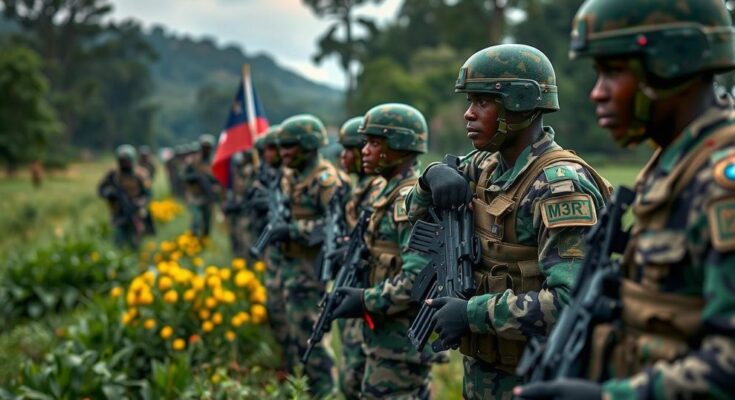Human Rights Watch has published a report accusing Rwandan forces and M23 rebels of serious civilian atrocities in eastern DRC, including indiscriminate attacks, sexual violence, and unlawful detentions. The humanitarian crisis continues to worsen, with widespread displacement and numerous reported violations of international law, prompting HRW to call for urgent investigations and enhanced civilian protections.
Human Rights Watch (HRW) has issued a report asserting that Rwandan military forces and the M23 rebel group have committed serious violations against civilians in the eastern Democratic Republic of the Congo (DRC). With ongoing military operations near the town of Sake, local populations and over half a million displaced people face heightened risks of violence and humanitarian crises. The M23 group, which is predominantly composed of Tutsi members and reportedly receives support from Rwanda, has been accused of various atrocities, including indiscriminate assaults, sexual violence, and the forced recruitment of child soldiers. The situation in North Kivu, a region severely affected by the conflict, is particularly dire. Displacement camps, such as Shabindu-Kashaka, have seen horrifying incidents including rocket strikes that have killed numerous civilians and devastated shelters. Notably, between May 3 and April, attacks resulted in the deaths of 17 individuals, including 15 children. Furthermore, HRW highlights that the Kanyaruchinya camp is facing extreme humanitarian conditions. Evidence gathered indicates that local militia fighters have engaged in unlawful detentions and extortion, with detainees coerced into cramped holding areas. The report raises alarming concerns regarding the prevalence of sexual violence, with reports indicating cases occurring at an alarming rate of 50 to 100 per week in certain areas. These incidents often involve assailants wearing military uniforms, which exacerbates fears among the civilian population. Such actions fall under violations of international humanitarian law, particularly the Fourth Geneva Convention, which aims to provide protections for civilians amid armed conflict. HRW has urged the governments of both the DRC and Rwanda to launch thorough investigations into these allegations of war crimes and to hold those accountable for sexual violence in accordance with the principle of command responsibility. Moreover, the organization calls for enhanced humanitarian support for vulnerable civilians, advocating for the provision of legal, social, and medical assistance to survivors of sexual violence. In addition, HRW recommends that both nations adopt the 2022 Political Declaration aimed at strengthening protections for civilians from explosive weapons in populated areas. Ultimately, HRW stresses the importance of international monitoring, particularly by the UN and EU, to ensure military assistance does not exacerbate the ongoing humanitarian crisis or violate human rights standards.
The ongoing conflict in the eastern Democratic Republic of the Congo (DRC) has drawn significant international attention due to the involvement of both local armed groups and foreign military forces. The M23, a rebel group believed to be supported by Rwanda, has been accused of committing various atrocities against civilians since its resurgence in 2021. As military confrontations intensify, the humanitarian situation has steadily deteriorated, leading to widespread displacement and increased vulnerability among local populations. Human Rights Watch has taken a strong stance on these matters, advocating for accountability and protection of civilians amid escalating violence.
In summary, the report by Human Rights Watch highlights grave concerns regarding the violations of civilian rights by Rwandan forces and the M23 rebel group in eastern DRC. The alarming rates of violence and humanitarian distress necessitate urgent international intervention and accountability. HRW’s call for investigation and support for affected individuals emphasizes the critical need for strengthening protections for civilians in conflict zones. The situation demands immediate attention to uphold international humanitarian standards and safeguard human rights.
Original Source: www.jurist.org




